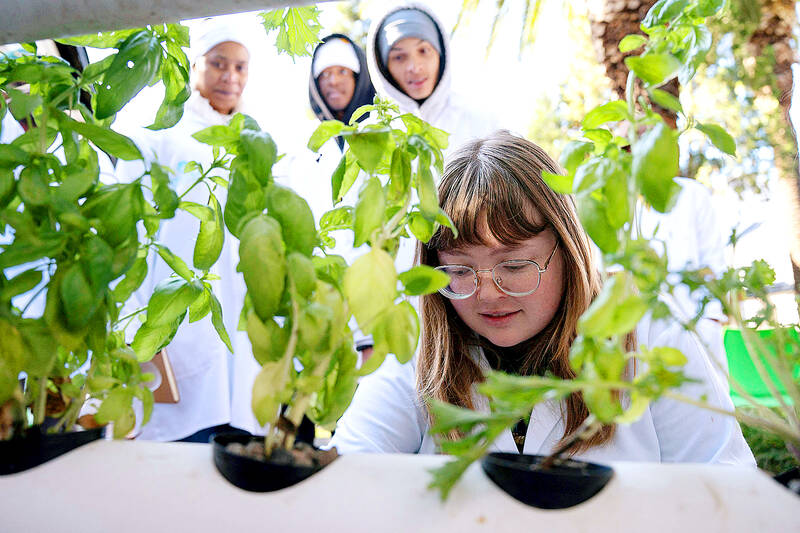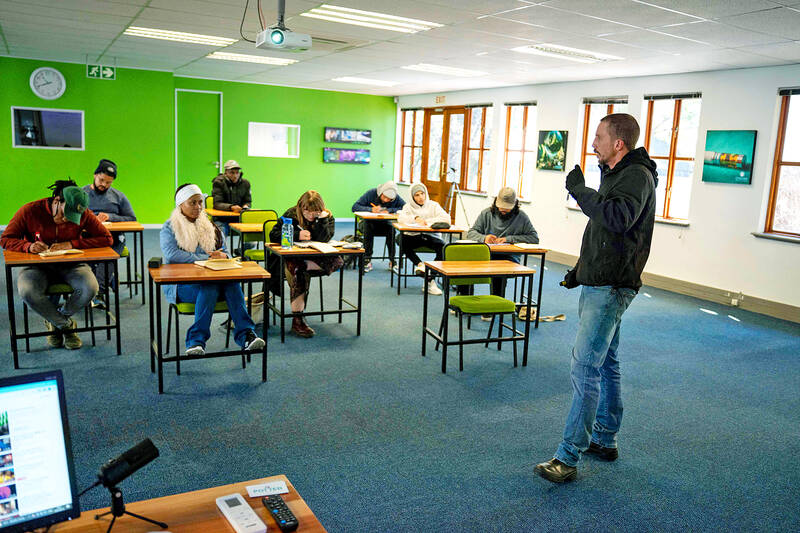In a leafy suburb of Johannesburg, green leaves adorn the walls of a school where students learn how to grow cannabis — but smoking pot is banned.
The teaching aims to dispel stigma around marijuana, said Linda Siboto, the cofounder of the institution, which styles itself as Africa’s first cannabis academy.
“It’s important for us to professionalize this industry and basically showcase that we’re not stoners with red eyes all the time talking about how great the weed is,” he said.

Photo: AFP
The academy is hoping to ride a global rethink of cannabis regulations.
From Spain to California, a growing number of governments are allowing people to light up.
In Africa, Lesotho approved cultivation of medicinal cannabis in 2017, paving the way for others such as Zimbabwe, Malawi and South Africa, which aspires to become a marijuana powerhouse.

Photo: AFP
South African President Cyril Ramaphosa last year said that cannabis has “huge potential” to draw investments and “create more than 130,000 new jobs,” a big pull in a country with an ailing economy and massive unemployment.
Named after a slang word for weed, the Cheeba Cannabis Academy is preparing students to partake in the expected bonanza.
“The industry, in order to develop, is going to need training and education,” Siboto, 42, said.
School days start with a yoga session, under a holistic approach, with subject matters including business, nutrition and futurism.
On a Thursday morning, about a dozen students sat at wooden desks before donning white coats to enter a laboratory at the back of the classroom. There Darian Jacobsen, a passionate cultivation teacher, showcased pruning techniques before moving on to some commonsense tips that learners write down in their notebooks.
“She’s not dead, sick or dying, she’s just a little thirsty,” Jacobsen, 28, said of a droopy-looking plant he takes out of an indoor grow tent.
The academy started offering online classes in 2020 before moving to its current premises last year. The flagship course lasts 12 weeks and costs about US$1,600.
The school has so far trained about 600 people and is hoping to get a boost from the government, which has announced grand, but so far sketchy, plans for cannabis.
South Africa’s top court decriminalized private and personal use of cannabis in a 2018 landmark ruling.
It tasked parliament with drawing up legislation, but that is overdue, creating “confusion” over exactly what is allowed, University of Cape Town researcher Simon Howell said.
Selling cannabis outside the medical realm remains a crime.
Cannabis clubs, a system where members pay to have their plants looked after, have sprung up across the country, but the legality of the concept is being tested in court. Meanwhile the government has issued hundreds of licenses to grow hemp and medical cannabis.
Even here, the industry is struggling to take off, analysts say.
In theory, South Africa has all it takes to become a major exporter.
Cannabis cultivation is a more than a century old tradition in parts of the country.
Costs are lower than in some competitors, such as Canada, as labor is relatively cheap, the weather is mild and the local currency comparatively weak.
“We have incredible sun here and lots of land, legacy growers and experience,” Cheeba cofounder Trenton Birch said.
Critics say the license system shuts out small farmers who have been growing cannabis illegally for decades, with starting costs of about US$1 million.
Many big growers are also having a hard time, pharmaceutical expert and cannabis entrepreneur Johann Slabber said.
They produce more than enough to cover local needs, but cannot export to Europe — the main target market — because their standards are too low and raising them often entails starting over from scratch, he said.
Out of almost 100 licensed farmers of medical cannabis, only five are currently exporting “on bulk scale,” he said.
The government has promised to streamline regulations to help the market to thrive.
Funding a manufacturing facility that buys yield from farmers, processes it up to European standards and exports it directly, could also work, Slabber said.
Still, despite the challenges, many are betting on the industry to succeed. The global cannabis market is expected to balloon to up to US$272 billion in 2028, various estimates show.
South Africa’s slice is forecast to soar to US$22 million in 2026, from US$5 million in 2021, market research agency Insight Survey said.
Expecting an increase in demand for specialized workers, other education providers have started operating alongside Cheeba.

To many, Tatu City on the outskirts of Nairobi looks like a success. The first city entirely built by a private company to be operational in east Africa, with about 25,000 people living and working there, it accounts for about two-thirds of all foreign investment in Kenya. Its low-tax status has attracted more than 100 businesses including Heineken, coffee brand Dormans, and the biggest call-center and cold-chain transport firms in the region. However, to some local politicians, Tatu City has looked more like a target for extortion. A parade of governors have demanded land worth millions of dollars in exchange

An Indonesian animated movie is smashing regional box office records and could be set for wider success as it prepares to open beyond the Southeast Asian archipelago’s silver screens. Jumbo — a film based on the adventures of main character, Don, a large orphaned Indonesian boy facing bullying at school — last month became the highest-grossing Southeast Asian animated film, raking in more than US$8 million. Released at the end of March to coincide with the Eid holidays after the Islamic fasting month of Ramadan, the movie has hit 8 million ticket sales, the third-highest in Indonesian cinema history, Film

BIG BUCKS: Chairman Wei is expected to receive NT$34.12 million on a proposed NT$5 cash dividend plan, while the National Development Fund would get NT$8.27 billion Taiwan Semiconductor Manufacturing Co (TSMC, 台積電), the world’s largest contract chipmaker, yesterday announced that its board of directors approved US$15.25 billion in capital appropriations for long-term expansion to meet growing demand. The funds are to be used for installing advanced technology and packaging capacity, expanding mature and specialty technology, and constructing fabs with facility systems, TSMC said in a statement. The board also approved a proposal to distribute a NT$5 cash dividend per share, based on first-quarter earnings per share of NT$13.94, it said. That surpasses the NT$4.50 dividend for the fourth quarter of last year. TSMC has said that while it is eager

‘IMMENSE SWAY’: The top 50 companies, based on market cap, shape everything from technology to consumer trends, advisory firm Visual Capitalist said Taiwan Semiconductor Manufacturing Co (TSMC, 台積電) was ranked the 10th-most valuable company globally this year, market information advisory firm Visual Capitalist said. TSMC sat on a market cap of about US$915 billion as of Monday last week, making it the 10th-most valuable company in the world and No. 1 in Asia, the publisher said in its “50 Most Valuable Companies in the World” list. Visual Capitalist described TSMC as the world’s largest dedicated semiconductor foundry operator that rolls out chips for major tech names such as US consumer electronics brand Apple Inc, and artificial intelligence (AI) chip designers Nvidia Corp and Advanced